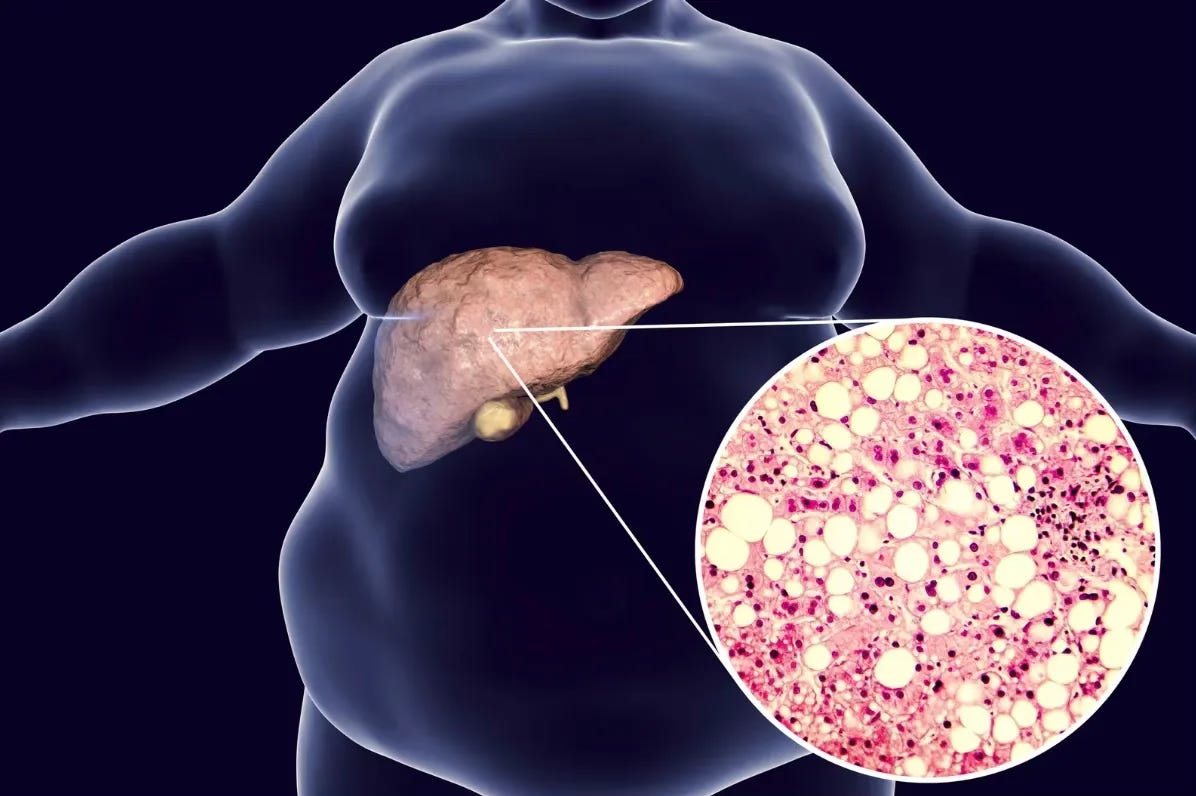Fatty Liver Disease: A Treatment Discovered by Accident
More than 25% of adults live with liver disease (the vast majority DON’T EVEN KNOW IT because in our Western culture, we tend to wait until symptoms appear before seeking treatment).
Our liver is an impressive organ! It’s at the core of hundreds of metabolic functions, and I know it well because I’ve suffered (in the past) from fatty liver disease.
Unfortunately, it was genetic—despite my healthy eating habits, avoiding alcohol, soda, and sugar. If you’ve followed me for a while, you know that I’ve managed to overcome it, even though no specific treatment exists aside from lifestyle improvements. My lifestyle was already optimized, so I felt at a loss for how to handle the situation.
I lived with a sword of Damocles hanging over me, wondering if this fatty liver would progress to cirrhosis. ⚔️
But let’s take a closer look at the liver and NAFLD (Non-Alcoholic Fatty Liver Disease) before diving into the treatment I discovered—completely by accident!
NAFLD, NASH, SFNA: Definition 📚
These terms all describe the same condition: a fatty, unhealthy liver.
NASH: Non-Alcoholic SteatoHepatitis
NAFLD: Non-Alcoholic Fatty Liver Disease
Liver disease, or NAFLD, is a serious condition affecting 1 in 3 people in Western populations, and globally, 25% (which is huge!). It’s characterized by an accumulation of fat in the liver, often asymptomatic until advanced stages.
This is a significant problem because our liver is one of the body’s most amazing organs. 🌟
Sure, all our organs are essential to our overall health, but the liver performs countless functions that keep everything running smoothly.
It’s the center of our metabolic health, with some of its most important functions including:
Synthesizing proteins 🧬
Producing hormones
Aiding digestion 🍽️
Cleaning the blood 💉
The liver can perform around 500 different functions, but one of its most demanding jobs is filtering our blood and deciding what should be there and what should not.
It processes incoming food nutrients, storing or preparing them for transport to other organs. It’s also responsible for filtering the blood of harmful toxins, alcohol, medications, fatty foods, and waste products. 🚰
Unfortunately, with everything we choose to consume these days, our liver has a tougher job than ever, and many of us live with some form of liver damage. 🚫
Chronic stress and liver damage can lead to long-term problems, such as fatty liver, inflammation, and eventually liver failure if untreated. 😰
More than 25% of adults live with liver disease (the vast majority don’t even know it because, in our Western culture, we wait until symptoms appear before seeking treatment).
NAFLD is characterized by an abnormal buildup of fat in the liver, and unfortunately, it doesn’t show symptoms until advanced stages, often leading to late diagnosis. 🕑
It’s estimated that more than 25% of adults worldwide have NAFLD. Strikingly, 20% of young adults in the UK, aged 18 to 35, have grade 1 steatosis, the first stage of liver damage, highlighting the seriousness of this progressive disease. 😱
Non-Alcoholic Fatty Liver Disease (NAFLD) is now the most common liver disease worldwide and is often seen in combination with obesity, diabetes, dyslipidemia (abnormal blood lipids), metabolic syndrome, and cardiovascular disease. 💊
VERY IMPORTANT: There is no specific treatment, but the liver can regenerate (partially and depending on the level of damage) through diet and exercise. 💪🥗
According to the European Association for the Study of the Liver guidelines, the only treatment for fatty liver (NAFLD) is counseling for a healthy diet and physical activity, as there are currently no available medicines or drug therapy for this liver condition.
So, let’s talk about the treatment I discovered by accident. 😲 Why by accident? Because, like Jourdain writing prose without knowing it, I treated myself without knowing it.




